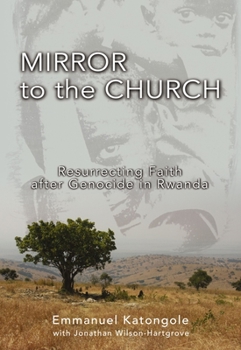Mirror to the Church: Resurrecting Faith After Genocide in Rwanda
Select Format
Select Condition 
Book Overview
We learn who we are as we walk together in the way of Jesus. So I want to invite you on a pilgrimage. Rwanda is often held up as a model of evangelization in Africa. Yet in 1994, beginning on the Thursday of Easter week, Christians killed other Christians, often in the same churches where they had worshiped together. The most Christianized country in Africa became the site of its worst genocide. With a mother who was a Hutu and a father who was a...
Format:Paperback
Language:English
ISBN:0310284899
ISBN13:9780310284895
Release Date:January 2009
Publisher:Zondervan
Length:176 Pages
Weight:0.44 lbs.
Dimensions:0.6" x 5.4" x 7.8"
Age Range:18 years and up
Customer Reviews
2 ratings
From tragedy to redemption
Published by Thriftbooks.com User , 14 years ago
TiTLE: From tragedy to redemption KEYWORDS: genocide; Hutu; Tutsi; Rwanda; Christianity; church; forgiveness; reconciliation; body of Christ; betrayal; Easter 1994; confused identity! FULL REFERENCE: Katongole, Emmanuel M. and Jonathan Wilson-Hartgrove, "Mirror to the Church: Resurrecting Faith after Genocide in Rwanda." Zondervan, 2009. /////////////////////////////////////////////////////// In this relatively short and easy-to-read book (176 pp.), Katongole recalls the Rwanda tragedy that pitted the Hutus against the Tutsis beginning, of all times, on Maundy Thursday of Easter week in the year 1994. Ironically, Rwanda is considered to be the "most evangelized [and thus Christianized] country" in the entire continent of Africa. Within a span of 100 days, hard-line [and heartless] Hutus mercilessly killed some 800,000 Tutsis and moderate Hutus throughout Rwanda (pp. 30). Ironically, the killers were, for the most part, neighbors and fellow church members (pp. 30). While the genocide forms the background for the entire book, Katongole is not dwelling on the massacre itself (except in Chapter 2, "What happened"). Instead, Katongole is more interested in analyzing and understanding the root causes of the conflict, going as far back as the colonial period and even earlier (See Chapter 3, "The story that made Rwanda"). The root cause of the Rwanda tragedy, argues Katongole, is not "tribalism," as widely reported by Western media in 1994 and beyond, but well nigh a case of "confused [and deliberately assigned] identities," in which the Christian church and colonial powers did play a considerable role. Beyond Chapter 3, Katongole moves from the local tragedy in 1994 Rwanda to the wider scene of the Western world (i.e., Europe and esp. the USA where Katongole, a Catholic priest, currently lives with his family and works as a teacher of theology at Duke University in North Carolina). Using the 1994 Rwanda tragedy as a case study, Katongole proceeds to make an indictment of the worldwide Christian church, and of Christianity, which he calls "Christianity without consequence" (pp. 84). On this same page, Katongole writes, "Maybe the deepest tragedy of the Rwandan genocide is that Christianity didn't seem to make any difference" (pp. 84). Expanding from this local, African context, Katongole proceeds to a wider generalization, causing him to write on the following page, "The story that made Rwanda is the story of the West. When we look at Rwanda as a mirror to the church [i.e., the main title and thus primary thesis of Katongole's book], it helps us realize what little consequence the biblical story has on the way Christians live their lives in the West [...]. Seeing this, we have to ask: does Christianity make any real difference in the West? The question is not so much whether Jesus' message has been proclaimed in all the earth. The real question is, what difference has the gospel made in people's lives?" (pp. 85). This is, in my view, the turning poi
Honest. Accessible. Provocative. Challenging.
Published by Thriftbooks.com User , 15 years ago
Honest. Accessible. Provocative. Challenging. Katongole's newest book is thoughtfully organized and engaging. His reflections are an important and crucial contribution to the literature on the Rwandan genocide. His own story informs the way he translates what happened in 1994 with a deep investment that ensures an honest narration of the tragic events.





